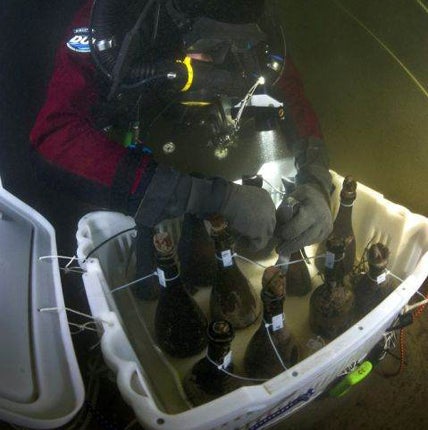Champagne still bubbly after 200 years at sea

It was lost at the bottom of the sea for 200 years, but the world's oldest champagne still fizzed when experts popped the cork for a tasting session in Finland yesterday.
Twenty specialist critics were invited to sample the vintage bubbly - but were divided over the taste, with some claiming it carried flavours of "linden blossom" and "chanterelles" while others noted a less exotic yeasty flavour.
"What strikes you the most is that it has such an intense aroma," wine expert Richard Juhlin said. "It's so different to anything you've tasted before."
Divers salvaged 168 bottles of champagne in July from a shipwreck which was discovered at the bottom of the Baltic Sea near the semi-autonomous Aland Islands, which lie between Sweden and Finland.
Although the age of the bottles is unknown, they are believed to date back to the early nineteenth century. Experts say they trump a Pernod Ricard 1825 vintage - previously thought to be the oldest champagne in the world.
Of the two bottles opened, one was identified as from the champagne house Veuve Clicquot, founded in 1722.
The drink was presented to the tasters by an archaeologist in white gloves and the ancient flavours were said to reveal hints of lime, honey and – less appetisingly – some varieties of fungus.
Remarkably, most of the bottles were recovered from the wreck intact. The champagne is thought to have been preserved by the consistent temperature of the water, low light levels and pressure from the gas used in the bottles, which would have prevented sea water from seeping in. It is thought that each surviving bottle could fetch around £40,000 at auction.
Join our commenting forum
Join thought-provoking conversations, follow other Independent readers and see their replies
Comments
Bookmark popover
Removed from bookmarks